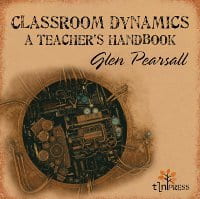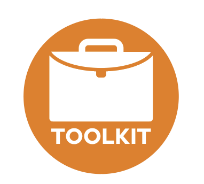
Edition #8
HOW CAN MY STUDENTS & COLLEAGUES HELP ME TO BE A GREAT TEACHER?
The eighth edition of the Graduate Teacher Learning Series focuses on how our students and colleagues can help us to become great teachers. This edition includes articles on how to build students responsibility for their own learning, self and peer assessment and understanding your responsibilities as a teacher. We also have new Toolbox articles, a new Meet the Graduate video, and we continue our Playing with Podcasts series where we talk to graduates, their mentors and experts around Victoria.
PUBLISHED DATE: 21 August 2019

We are running a competition.
The first 20 people to read Edition 8, complete the feedback survey and then email a screenshot of your responses to ben@tln.org.au
will receive a free copy of
Glen Pearsall’s “Classroom Dynamics” book.

THE TEACHING YEAR
In this edition, Belinda talks about starting your Victorian Institute of Teaching (VIT) registration process to transition from provisional to full registration.
FEATURE ARTICLES:
In each edition we will feature articles written by various authors around three key areas.
1. Student Engagement as a Behaviour Management Strategy
2. Teacher Wellbeing & Resilience
3. Using Formative Assessment to Improve Learning
The three feature articles for this edition can be accessed from the links below.

HOW DO I GET MY STUDENTS TO TAKE RESPONSIBILITY FOR THEIR OWN LEARNING?
FOCUS AREA: Student Engagement as a Behaviour Management Strategy
By: Tanya Whiteside teaches at Berwick Fields Primary School and Swinburne University
“It begins from day one and needs to be taught explicitly.” Tanya Whiteside talks about the effort and persistence a teacher needs to apply to enable students to develop as independent learners.
UNDERSTANDING YOUR PROFESSIONAL ROLE
FOCUS AREA: Teacher Wellbeing & Resilience
By: Benjamin Pisani, a secondary teacher who is on a secondment to the Teacher Learning Network.
Teaching is a complex and demanding role and all teachers must ensure they are aware of their professional responsibilities. It can be a steep learning curve for a graduate teacher. There is a wide range of material and organisations available to help you, but you do have an obligation to your school, your community and yourself to take the time to build your awareness of your professional responsibilities.
SELF & PEER ASSESSMENT
FOCUS AREA: Using Formative Assessment to improve student learning.
By: Prue Pisani, a primary teacher on secondment to the Department of Education & Training
Why is self-assessment so fundamental in learning? Being able to assess and understand your own progress in learning can motivate you as a learner, and enable you to identify where you should be going next. Prue Pisani talks about why self and peer assessment is such an important skill.
MEET THE GRADUATE
“The best thing about it was that I was prepared. I knew exactly what I needed to do for each lesson. I pretty much spent the lesson getting to know my students, which was the best thing I could’ve done.”
Graduate Belinda Dennis from Bendigo Senior Secondary College talks about life balance and the excitement of seeing students achieving their goals.

PLAYING WITH PODCASTS
Playing with podcasts brings together the different perspectives of graduate teachers, mentors and experienced teachers.
“My students inspire me by their curiosity and questions that they ask. When I see my students truly interested and engaged in a lesson, it motivates me to create more exciting lessons.” In this edition, we meet graduate teacher Nicole Williams and her Mentor Aisha Shorrock at Berwick Fields Primary School.
Interview with a Graduate
Interview with a Mentor

UNDERSTANDING THE EDUCATION LANDSCAPE
As a graduate teacher, how can you best support the learning and developmental needs of our Koorie communities? A great starting point is to understand the different roles of the Koorie Education Workforce.
WHAT WORKED FOR ME
Recent graduate teacher Noah Kim talks about how using your colleagues can help you to build context-specific understanding of resources, and trusting yourself to have a go at something new.
GRADUATE TEACHER CONFERENCES
A very big thank you to the 1100 plus graduate teachers who have registered and to all of those who have brought their energy, vision, and creativity to each of the events to date. Read about what has been going on at the conferences and review the strategies and insights from some of the attendees.
Victorian Institute of Teaching
The Victorian Institute of Teaching (VIT) is an independent statutory authority for the teaching profession, whose primary function is to regulate members of the teaching profession. It is a legal requirement for all teachers to be registered with VIT in order to be employed in a school or early childhood education and care service or Victorian children’s service.
The VIT specifies the requirements for moving from provisional to full registration on their website. After graduation, graduate teachers register with the VIT as provisionally registered teachers. To achieve full registration by the end of the second year of teaching, graduate teachers must provide the VIT with the evidence that they:
- have met the Australian Professional Standards for Teaching at the proficient teacher level using the inquiry approach, and
- have taught for a total of at least 80 days in one or more Australian or New Zealand schools or early childhood services.
Teacher mentors work with graduate teachers to undertake professional learning, which may include peer observation to continuously improve their teaching, collect evidence of their work and apply for full registration.
For further information see: www.vit.vic.edu.au/registered-teacher/moving-to-full-registration
eduPay
eduPay is the Department’s HR and payroll system. You can apply for leave and check your leave and pay information using eduPay Employee Self Service (ESS).
You can login to eduPay System via your school internet connection at: https://edupay.eduweb.vic.gov.au/
If you wish to access eduPay and ESS from an external location, such as from home, you can login at: https://ess.sras.eduweb.vic.gov.au/
Edumail
Edumail is the Department’s email system system. You can access your emails and digital communications using Edumail.
You can login to the Edumail System via the following linkt: https://www.edumail.vic.gov.au
Australian Education Union
The Australian Education Union (AEU) represent and advocate for all teachers, principals and support staff working in government schools, early childhood, TAFE, disability and adult education.
The AEU note that “graduate teachers face specific challenges at work” and have developed a specific resource for graduate teachers which includes a New Educators Network (NEN) and information about pay and conditions.
For further information see: https://www.aeuvic.asn.au/your-job/graduate-teachers
Victorian Curriculum and Assessment Authority
The Victorian Curriculum and Assessment Authority (VCAA) provides high-quality curriculum, assessment and reporting advice for all Victorian students. Engagement with the resources will depend on the learning area and level being taught.
The following links will provide graduate teachers with further information regarding:
- Victorian Early Years Learning and Development Framework (VEYLDF) – https://www.vcaa.vic.edu.au/Pages/earlyyears/index.aspx
- Victorian Curriculum F-10 – https://www.vcaa.vic.edu.au/pages/foundation10/f10index.aspx
- National Assessment Program Literacy and Numeracy (NAPLAN) – https://www.vcaa.vic.edu.au/Pages/prep10/naplan/index.aspx
- Victorian Certificate of Education (VCE) – https://www.vcaa.vic.edu.au/Pages/vce/index.aspx
- Victorian Certificate of Applied Learning (VCAL) – https://www.vcaa.vic.edu.au/Pages/vcal/index.aspx
The VCAA also implements Vocational Education and Training (VET) opportunities for senior secondary students and celebrate student achievement through excellence and awards programs, such as the Season of Excellence.
For further information see: https://www.vcaa.vic.edu.au/
FUSE
FUSE is a Department portal with a wide variety of teaching resources. You can use FUSE to:
- DISCOVER: filter, browse and discover resources for learning and teaching
- ENGAGE: immerse yourself in content with a range of great resource types, as a teacher you can even create groups and personalise resources
- SHARE: connect your learning and teaching with others by using the sharing features on all FUSE resources
You will need your eduMail details to access some features of FUSE, such as uploading your own content and sharing packages of resources.
For further information see: https://fuse.education.vic.gov.au/
In Our Classrooms
In Our Classrooms is an online space for teachers to find best practice approaches, evidence-based classroom resources, professional development opportunities and stories that celebrate the education profession. New articles are sent automatically in a newsletter each fortnight to all Victorian government school teachers, but In Our Classrooms is open to anyone interested in best practice in education and evidence-based teaching approaches.
For further information see: https://www.education.vic.gov.au/school/teachers/classrooms/Pages/default.aspx
To subscribe to In Our Classrooms: https://confirmsubscription.com/h/d/9DC75686B8867D58
The Victorian Teaching and Learning Model
The Victorian Teaching and Learning Model (VTLM) brings the framework for improving student outcomes (FISO) into the classroom. It creates a line of sight between the whole-school improvement approach and classroom practice.
The Victorian teaching and learning model consists of four components:
- A Vision for Learning helps create a unified set of values and beliefs to drive a high performance learning culture.
- The Practice Principles for excellence in teaching and learning (Practice Principles) are nine signature pedagogies which make the difference in improving student achievement and motivation.
- The Pedagogical Model describes what effective teaching looks like in the classroom and helps teachers apply the practice principles.
- The High Impact Teaching Strategies (HITS) are ten instructional practices that reliably increase student learning wherever they are applied.
For further information see: https://www.education.vic.gov.au/school/teachers/teachingresources/practice/improve/Pages/Victorianteachingandlearningmodel.aspx
The Literacy Teaching Toolkit
The Literacy Teaching Toolkit provides practical advice and high impact teaching practices that improve outcomes in reading, writing and speaking and listening. It includes specific resources for teaching literacy in Primary and Early Childhood as well as a guide to designed to support school leaders and teachers to understand and use the toolkit.
For further information see:
School Term Dates
You can access the School Term Dates and Holidays in Victoria through the following link:
https://www.education.vic.gov.au/about/department/Pages/datesterm.aspx?&Redirect=1
The Learning Series is designed for you, the Graduates and it is important that you provide feedback and share your ideas so that we can continue to develop and improve the content for our future issues.
Your feedback drives the ways in which we plan and present the content in each edition so please take the time to share your thoughts and ideas and play a role in driving this program.






